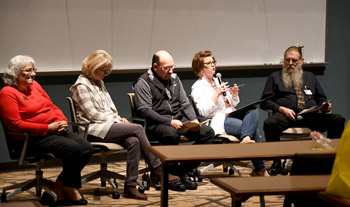

The National Park College (NPC) Honors Program, in partnership with Phi Theta Kappa
and the NPC Library hosted a viewing of Chasing the Dragon: The life of an Opiate
Addict.
The film tells the story of addiction, not only how it begins, but how it systematically
destroys lives. Through the story of several people, the audience learns how the decision
to take a pill, a shot or a swallow can alter the future. Drugs do not discriminate;
they do not care about race, ethnicity, sex, bank accounts or status. Drugs end in
disappointment, institutionalization, incarceration, felony convictions, dismemberment
and often times death.
 Following the viewing, James Montgomery, Criminal Justice faculty at National Park
College moderated a panel discussion. The panel consisted of Sabrena Lewis, RN, Steve
Arnold, Director of Campus Security, Susan Millerd, MSW and Pat Brannin, Community
Events Coordinator at the Criminal Justice Institute of Arkansas.
Following the viewing, James Montgomery, Criminal Justice faculty at National Park
College moderated a panel discussion. The panel consisted of Sabrena Lewis, RN, Steve
Arnold, Director of Campus Security, Susan Millerd, MSW and Pat Brannin, Community
Events Coordinator at the Criminal Justice Institute of Arkansas.
Pictured from left to right: Pat Brannin, Susan Millerd, Steve Arnold, Sabrena Lewis,
and James Montgomery.
Lewis explained signs that the public should look for to recognize an overdose victim
including pinpoint pupils, slowed breathing and the lack of responsiveness.
Arnold spoke on how police are being more proactive in helping with treatment and
rehabilitation rather than just institutionalization. “The use of drugs or addiction
just leads to more crimes, so if we can help people with their addictions, we can
also help our communities,” stated Arnold.
Millerd brought light to the different organizations in the community where treatment
and assistance could be found such as Quapaw House and The Ouachita Behavioral Health
and Wellness Center.
Brannin helps manage the “Don’t Run, Call 911” campaign in Arkansas. The Arkansas
Overdose Program focuses on calling 911 in the face of an overdose and on the education
of the Joshua Ashley-Pauley Act “Good Samaritan” law.
Assistant Special Agent in Charge Scott Reinhardt stated “based on an average student
enrollment at NPC of 2,768, it would only take 16 days to kill the entire student
population” based on the overdose numbers reported in 2016. Reinhard goes on to state
that “more Americans died in 2016 of drug overdoses than died in the entirety of the
Vietnam War.”